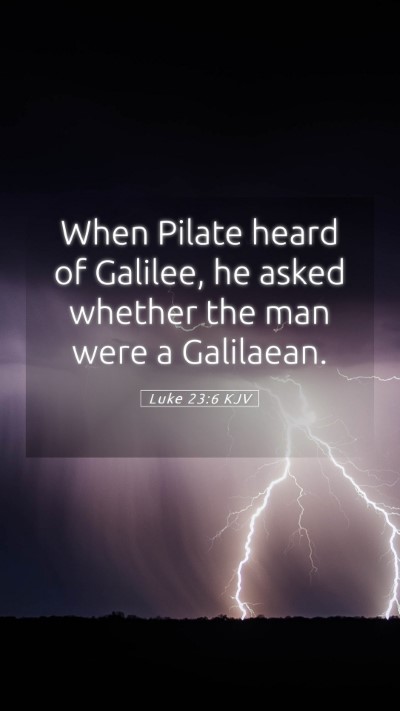Understanding Luke 23:6 - A Comprehensive Commentary
Luke 23:6 states: "When Pilate heard of Galilee, he asked whether the man were a Galilean." This verse comes during the trial of Jesus, where Pontius Pilate is seeking to determine jurisdiction over Jesus as accusations are brought against Him.
The significance of this verse lies in the political maneuvering and the fulfillment of God’s plan through the orchestration of these events. Below, we explore the commentary and insights from renowned theologians like Matthew Henry, Albert Barnes, and Adam Clarke to provide a deeper understanding of this scripture.
Bible Verse Meanings
-
Historical Context:
This verse occurs in the trial of Jesus before Pilate, highlighting the complicated political landscape of Judea under Roman rule. Pilate’s inquiry reflects typical Roman legal proceedings where jurisdiction plays a significant role.
-
Jesus’ Identity:
By seeking to identify Jesus as a Galilean, Pilate aims to shift responsibility for Jesus’ trial to Herod Antipas, who governed Galilee, illustrating the avoidance of responsibility by Pilate.
Bible Verse Interpretations
-
Matthew Henry:
Henry emphasizes the providence of God in these events, suggesting that this questioning by Pilate was part of the divine plan, leading towards the crucifixion and the fulfillment of Old Testament prophecies concerning the Messiah.
-
Albert Barnes:
Barnes notes the irony of Pilate’s inquiry since, although Pilate is acting with authority, he is unaware that he is part of a greater narrative that ultimately leads to salvation through Jesus’ sacrifice.
-
Adam Clarke:
Clarke’s commentary highlights the significance of Galilee in the ministry of Jesus and the political implications of his origin, indicating that Pilate's interest in Jesus' Galilean roots illustrates the fragmented political authority in Judea at that time.
Bible Study Insights
The verse opens up numerous avenues for exploration in Bible study groups and online discussions. The intriguing dynamics between political authority and divine purpose can inspire extensive biblical exegesis as participants explore the dual themes of justice and mercy.
Application of Luke 23:6
-
Understanding Jurisdiction:
Christians today can learn about the complexities of authority, both divine and human, and how Jesus navigated unjust systems.
-
Finding Jesus in Adversity:
This verse encourages believers to see God’s hand in moments of trials, reminding them that even wrongful accusations can serve a higher purpose in God’s kingdom.
Cross References
- Matthew 27:2: Discusses the delivery of Jesus to Pilate.
- Luke 23:5: Highlights the accusations brought against Jesus.
- John 18:28-29: Further provides details on the trial before Pilate.
- Luke 9:9: References Herod's desire to see Jesus, indicating the wider political implications.
- Matthew 2:22: Refers to Jesus’ upbringing in Nazareth and His Galilean roots.
Conclusion
Luke 23:6 serves as a pivotal moment in the narrative of Jesus' trial, filled with complexity and foreshadowing of the events to come. Understanding this scripture through various commentaries enriches our Bible study resources, deepening our engagement with the text and its implications for faith and practice.


